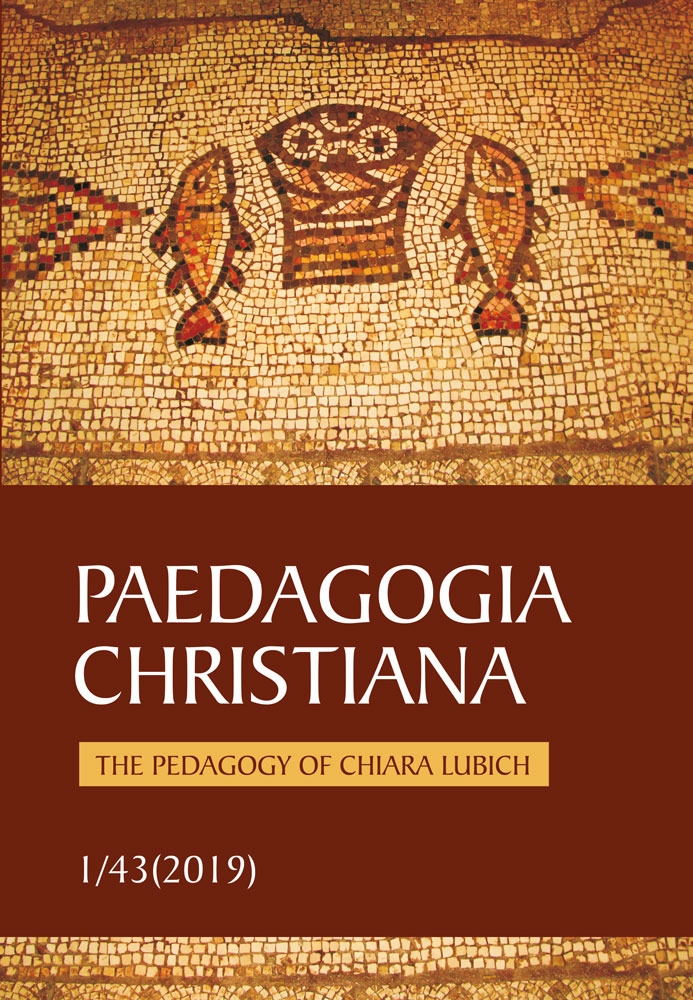Building Interculturality in Difficult Times. Chiara Lubich’s “Thought-Life” Proposal
DOI:
https://doi.org/10.12775/PCh.2019.016Keywords
intercultural education, dialogue, multiculturality, community, pedagogy of unityAbstract
The thought and action of Chiara Lubich are very important for intercultural education. She has given us many theoretical and practical tools – reinforced by the testimony lived with the greatest coherence – to learn to be intercultural as people, but also as groups, as specific collective and cultural identities. Her experience can be told as an experience of education in dialogue, a micro-macro dialogue that unfolds from the immediate challenge of interpersonal relationships to widen to the areas of political, intercultural, interreligious relations. This article analyses some aspects of today’s multicultural reality, which challenges the world of education, and – assuming the demanding perspective of interculturality – examines some of Chiara’s proposals, which are based on the idea of a person-dialogue, person-relationship and intercultural person. These proposals, methodologically essential in the transition from reality-challenge to the goals indicated by interculturality, are effectively communicated by Lubich in his fundamental book “The Art of Loving”, in which she presents the secrets for interpersonal, social, intercultural relations, the inescapable attitudes that are configured as “concrete love”. Some passages are here quoted that present the pedagogical principles of reference according to Chiara Lubich, taken from the lecture entitled “Uomo-Mondo” (1972), from the lecture held in Paris on December 17, 1996, when she received the UNESCO prize for “Peace Education”, from the lectio magistralis held in Washington on 10th November 2000 (Honorary doctoral Degree in Education from The Catholic University of America).
References
Balducci, Ernesto. L’uomo planetario. Milano: Camunia, 1985.
Buber, Martin. Sentieri in Utopia. Milano: Edizione di Comunità, 1967.
Eliade, Mircea. Miti sogni e misteri. Milano: Rusconi, 1976.
Ferrara, Pasquale. La politica inframondiale. Roma: Città Nuova, 2014.
Kozubek, Mariola. „Dialog międzyreligijny w życiu i działalności Ruchu Focolari”. Paedagogia Christiana 1/27 (2011): 99–117.
Lubich, Chiara. „Charyzmat jedności i pedagogika”. W: Chiara Lubich. Charyzmat jedności, red. Michel Vandeleene, 313–320. Kraków: Fundacja Mariapoli, Wydawnictwo M, 2007.
Lubich, Chiara. Colloqui con i gen, 1970–1974. Roma: Citta Nuova, 1999.
Lubich, Chiara. Jezus Opuszczony. Warszawa–Rzeszów: Fundacja Mariapoli, Indygo, 2015.
Lubich, Chiara. L’arte di amare. Roma: Città Nuova, 2005.
Milan, Giuseppe, Margherita Cestaro. We Can Change. Seconde generazioni. Mediazione interculturale, città. Lecce Pensa: MultiMedia, 2016.
Milan, Giuseppe. “Dal «metodo per le vie brevi» al dialogo in profondità e in altezza. Creatività per l’intercultura”. Studium Educationis 2 (2015): 115–126.
Milan, Giuseppe. “Ospitarsi”. In: Intercultura, ed. Anna Granata, 137–150. Roma: Città Nuova, 2012.
Milan, Giuseppe. Educare all’incontro. La Pedagogia di Martin Buber. Roma: Città Nuova, 1994.
Morin, Edgar. I sette saperi necessari all’educazione del futuro. Milano: Raffaello Cortina, 2001.
Sorgi, Tommaso. Costruire il sociale. La persona e i suoi «Piccoli mondi». Roma: Città Nuova, 1998.
Una città ben fatta. Il gioco creativo delle differenze, red. Giuseppe Milan, Emma Gasperi. Lecce: Pensa MultiMedia, 2012.
Downloads
Published
How to Cite
Issue
Section
Stats
Number of views and downloads: 681
Number of citations: 0



